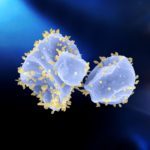Lien vers Pubmed [PMID] – 31142823
Nat. Rev. Microbiol. 2019 May;17(7):449-458
Viruses are ubiquitous parasites of cellular life and the most abundant biological entities on Earth. It is widely accepted that viruses are polyphyletic, but a consensus scenario for their ultimate origin is still lacking. Traditionally, three scenarios for the origin of viruses have been considered: descent from primordial, precellular genetic elements, reductive evolution from cellular ancestors and escape of genes from cellular hosts, achieving partial replicative autonomy and becoming parasitic genetic elements. These classical scenarios give different timelines for the origin(s) of viruses and do not explain the provenance of the two key functional modules that are responsible, respectively, for viral genome replication and virion morphogenesis. Here, we outline a ‘chimeric’ scenario under which different types of primordial, selfish replicons gave rise to viruses by recruiting host proteins for virion formation. We also propose that new groups of viruses have repeatedly emerged at all stages of the evolution of life, often through the displacement of ancestral structural and genome replication genes.

